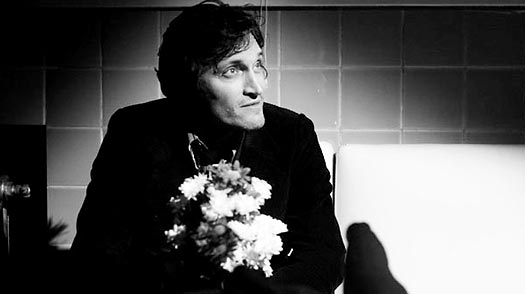
Vincent Gallo in Francis Ford Coppola's Tetro
Yesterday, on a sunny first day of the 62nd Cannes Film Festival, it seemed as if every child on the Croisette was holding a brightly colored balloon, courtesy of Disney/Pixar's Up. In the Lumiere auditorium of the Grand Palais, the film opened to a rapturous reception from the black-tie audience — 2,400 formally dressed folks, all sporting the goggles required for Up's 3D experience — and this Riviera town partied late into the night.
Today, though, the weather turned cloudy, and you could feel the helium seeping out of the balloons. After the buoyancy of the Up premiere, Cannes quickly settled into a miserabilist phase, with three films from three continents that detailed how rotten the world is for the young, the horny and the searching. Andrea Arnold's Fish Tank, a dispiriting exercise in the Ken Loach school of Brit underclass verismo, did boast a showy performance from its lead, Katie Jarvis as the 15-year-old daughter of an East London single mum, that could get Best Actress attention on closing night. Lou Ye's Spring Fever, a gayish mainland Chinese drama with lots of bed and shower love-making, wasted a cunning premise — the jealous wife of one of the male lovers has hired a snooping detective, with whom she also has sex — on miles of aimless scenes of walking and driving, shouting and pouting. (See pictures of the Cannes 2009 Red Carpet.)
Then there was Tetro, the first film Francis Ford Coppola has shown in Cannes since his Apocalypse Now copped the Palme d'Or in 1979. The debut of a new Coppola stirred hope and foreboding; and both were warranted. The great news is that this unquestioned giant of American cinema, who sired the Godfather films, The Conversation and Apocalypse Now in the '70s, is still making independent-minded movies three decades later. The bad news is that he made this one.
A little backstage politics: Cannes' scheduling boss, Thierry Fremeaux, had rejected Tetro for the official competition but offered to show it as a special selection in a prime-time slot — the one filled last year, to considerable acclaim, by Woody Allen's Vicky Cristina Barcelona. Feeling slighted, Coppola gave the film to the rival Directors' Fortnight program, established after the events of May 1968 as a less stodgy counter-Cannes festival and which, when Coppola brought Apocalypse Now here, was a vibrant showcase for more inventive, reckless and demanding films. But things change in 30 years. Lately, as the official program has expanded, the Fortnight has shrunk to nearly irrelevant status. The vaunted director's appearance in this sideshow was the equivalent of, say, Jimmy Carter joining the Republican Party. (See the top 10 Cannes Film Festival movies of all time.)
Jimmy Carter, who's he? Young moviegoers may have the same woolly reaction to Coppola's name. You know what? He doesn't care. After spending the '80s directing commissioned films to pay off debts his Zoetrope Studios had incurred, then out of cinema for a decade until his return with the romantic Youth Without Youth in 2007, Coppola is happy to be making films his way, with his money (which now comes largely from his very productive vineyard). He couldn't get much more personal than this story — his first original script since The Conversation 35 years ago — about an Italian family with rancor and secrets galore. Think The Godfather, but with artists instead of gangsters.
Bennie (Alden Ehrenreich), 17, has come off a cruise ship, where he works as an assistant waiter, to the Buenos Aires flat that his reclusive, much-older brother Tetro (Vincent Gallo) shares with mistress Miranda (Maribel Verdu). Tetro, a budding writer, had walked out on the family after a fight with his domineering, priapic father Carlo (Klaus Maria Brandauer). Carlo, a famous conductor who hounded his own musician brother for being less successful, had stolen Tetro's dancer girlfriend and taken her as his second wife. Bennie discovers an unfinished play of Tetro's, written in code, about two generations of animosities and betrayals. Bennie, who has long idolized Tetro, takes the manuscript, writes an ending and has it staged in a local arts pageant. That sends skeletons dancing out of the family closet for the therapeutic finale.
See the 100 best movies of all time.
See pictures of the youngest Oscar nominees for best actress.